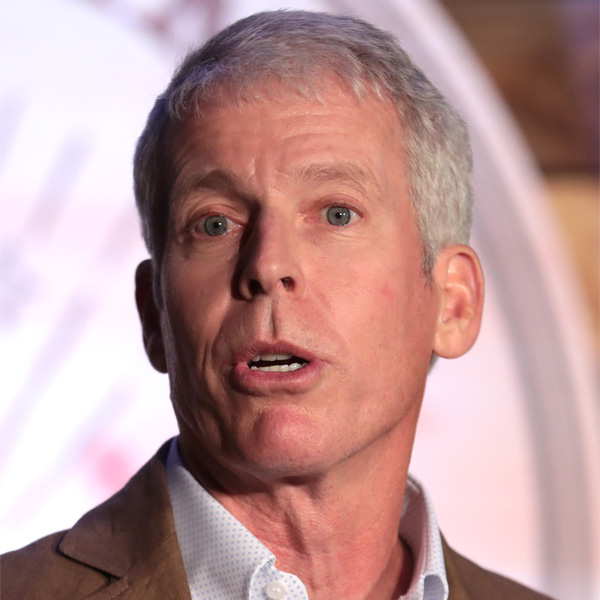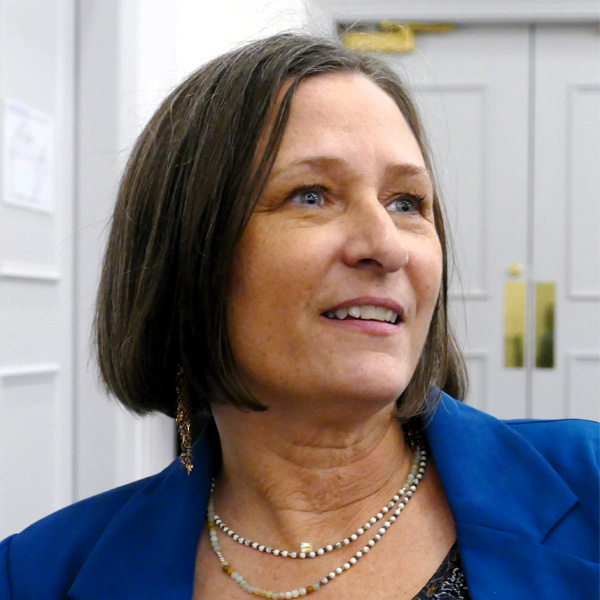President-elect Donald Trump is laying the ground for a major, fossil-fuel-friendly U-turn in U.S. energy policy with his nominations of North Dakota Gov. Doug Burgum (R) as secretary of the interior and Chris Wright, a fracking company CEO, as secretary of energy.
In a Nov. 15 statement, Trump also announced that Burgum will chair “the newly formed and very important National Energy Council, which will consist of all departments and agencies involved in the permitting, production, generation, distribution, regulation [and] transportation of all forms of American energy.”
The council will focus on “cutting red tape, enhancing private-sector investments across all sectors of the economy and [promoting] innovation over longstanding, but totally unnecessary, regulation.”
While pledging to expand all forms of energy production, the statement reiterates Trump’s intention to “drill, baby, drill” to increase U.S. production and consumption of fossil fuels with the goal of increasing baseload power and reducing energy costs.
Trump first teased Burgum’s nomination during a speech at the America First Policy Institute Gala at Mar-a-Lago on Nov. 14. “I won’t tell you his name,” he said. “It might be something like Burgum. He’s going to head the Department of Interior, and he’s going to be fantastic.”
The announcement of Wright’s nomination came Nov. 16. A self-described “tech nerd turned entrepreneur,” he is the CEO of Liberty Energy, a Denver-based company that, according to the company’s website, offers efficient, lower-emission fracking equipment.
Wright also promotes the ongoing use of fossil fuels — which he calls “hydrocarbons” — as critical to progress in human living conditions. In a video, posted to his company’s website in April, Wright argued that opposition to fossil fuels is limited to industrialized countries, but “global demand for oil, natural gas and coal are all at record levels and rising. No energy transition has yet begun.
“Modern alternatives like solar and wind work in one sector, the electricity sector, and they don’t even have prospects to replace most of the uses of hydrocarbons, making energy more expensive.”
Burgum would replace Interior Secretary Deb Haaland, the first Native American to hold the position, and Wright would replace Energy Secretary Jennifer Granholm, the second woman to lead the department.
Under Granholm, the Department of Energy has become a major driver of the commercialization and scaling of a range of clean energy technologies. The department received about $35 billion from the Inflation Reduction Act of 2022 and has been distributing the funds to a range of clean energy programs — as well as to states, cities and companies through loans — over the past two years, intended to decarbonize the U.S. to meet President Joe Biden’s policy of reducing emissions by half by 2050.
Trump is expected to issue a halt on further distribution of unspent IRA funds as soon as he is in office and to lift the current pause on new LNG export facilities.
Burgum
“Serving as interior secretary is an opportunity to redefine and improve upon the federal government’s relationship with tribal nations, landowners, mineral developers, outdoor enthusiasts and others, with a focus on maximizing the responsible use of our natural resources with environmental stewardship for the benefit of the American people,” Burgum said in a statement. He said the new council “will foster an unprecedented level of coordination among federal agencies to advance American energy.”
Speaking to reporters in North Dakota on Nov. 12, Burgum said the second Trump administration is “thinking about significant, substantial change. They are thinking about changing the direction of how the federal government works.”
Born and raised in North Dakota, Burgum, 68, started out as a computer entrepreneur, growing a local company, Great Plains Software, from an accounting software startup to a publicly traded firm with 2,200 employees across the state. The company was acquired by Microsoft in 2001.
Before winning his first election as governor in 2016, Burgum worked for Microsoft for several years and then started a real estate development company and a venture capital firm.
Re-elected in 2020, Burgum had supported an all-of-the-above approach to energy, prioritizing innovation over regulation. North Dakota is the third-largest producer of crude oil in the U.S.
At the same time, the Energy Information Administration reports that wind is the second-largest source of electricity in the state, providing about 40% of its power, versus the 55% provided by coal.
As a state that produces more energy than it consumes, North Dakota is also seen as a potential new hub for data center development. The state has only seven data centers, but those facilities have driven the highest percentage of power demand increase in the U.S. — 37% — according to EIA figures. Six new data centers are under development in the state.
In 2021, hours before Granholm landed for a state visit, Burgum issued a challenge for North Dakota to become carbon-neutral by 2030, primarily through carbon capture and sequestration. A press release from the governor’s office at that time noted that North Dakota has “252 billion tons of underground storage capacity — enough to store 4,400 years’ worth of the state’s carbon output or 50 years’ worth of the nation’s energy-related carbon output.”
“We can reach carbon neutrality in the state of North Dakota by 2030 without a single mandate, without any additional regulation. We can get there just through the innovation and the different geology that we have,” Burgum said at the time. “We are excited to hear how the federal government is going to join the states, join the private sector, in investing in the technology to help us get to where we need [to be].”
Burgum could have run for a third term as governor, but this year, he said he would not. He briefly ran for president in 2023 but dropped out of the race before the Iowa caucuses and threw his support to Trump. According to multiple media reports, Burgum helped organize a now-infamous campaign dinner for Trump and oil and gas executives, during which Trump asked for $1 billion in donations from the group.
Burgum also has a close relationship with Harold G. Hamm, the founder and CEO of Continental Resources, one of the nation’s largest independent oil producers, who also helped organize the dinner.
Wright
Wright also is close to Hamm, who recently told Hart Energy, an oil and gas industry publication, that Wright was his top choice to lead DOE.
In a statement announcing Wright’s nomination, Trump called him a “leading technologist and entrepreneur in energy.”
“He has worked in nuclear, solar, geothermal, and oil and gas,” Trump said. “Most significantly, Chris was one of the pioneers who helped launch the American shale revolution that fueled American energy independence and transformed the global energy markets and geopolitics.”
Wright has no prior government experience. His online profiles are focused on his education and career as a fracking pioneer. He has an undergraduate degree in mechanical engineering from the Massachusetts Institute of Technology and “did graduate work” at MIT and the University of California, Berkeley, according to his company profile.
Pinnacle Technologies, which he started in 1992, was an early mover in fracking. He served as CEO of the company until 2006 and founded Liberty, originally Liberty Resources, in 2010.
He also describes himself as a “passionate father, grandfather, skier, cyclist, climber and outdoor enthusiast,” and he was a major donor to Trump’s campaign, providing at least $228,390, according to ABC News.
Wright has used social media to promote his beliefs that climate change is not a major threat and fossil fuels are critical to human life and progress. In a 2023 video, he claimed there is no “climate crisis. … The only thing resembling a crisis with respect to climate change is the regressive, opportunity-squelching policies justified in the name of climate change.”
In the April 2024 video, he backtracked slightly, saying that “climate change is a global challenge. I’ve worked in it for 20 years, but it’s far from the world’s greatest threat to human life.
“Zero energy poverty by 2050 is a superior goal to net-zero emissions 2050 … for two reasons. No. 1, it’s achievable, and No. 2, progress [toward] that goal makes the world a better place. I can’t say either one is true for net zero 2050.”
Wright also links fossil fuels to general goals to improve life in developing countries. In January, he launched the Bettering Human Lives Foundation, which promotes the use of propane cooking appliances to replace the use of wood, charcoal and dung for cooking in many developing countries. Wright has pledged $1 million per year to fund the effort.
Reactions
The double nomination for Burgum quickly had multiple media outlets dubbing him Trump’s “energy czar,” while Wright was characterized as a Trump campaign donor and loud opponent of efforts to combat climate change.
Reactions to both nominations were, predictably, divided.
Sen. John Barrasso (R-Wyo.), who will be the Senate majority whip in the new Congress, praised both.
Burgum “knows what it takes to unleash American energy,” Barrasso said. “He recognizes how important our federal lands are for energy and mineral production, grazing and recreation. As North Dakota’s governor, he’s shown he can balance environmental stewardship with record energy development.”
Wright, he said, is “an energy innovator who laid the foundation for America’s fracking boom. … Our country is desperate for an [energy] secretary who understands how important American energy is to our economy and our national security.”
Manish Bapna, CEO of the Natural Resources Defense Council, linked Burgum to Trump’s “plan to open more public lands and ocean waters to the dangers of oil and gas drilling. That’s the wrong direction for the country. Now he’s tapped someone with close ties to the oil and gas industry to spearhead the scheme.”
Ben Jealous, executive director of the Sierra Club, blasted Wright as “utterly unqualified for the job” and declared that “the Sierra Club is ready to do all we can to stop him and his pro-polluter agenda.
“Chris Wright is a climate denier who has profited off of polluting our communities and endangering our health and future,” Jealous said in a statement.
If confirmed, Wright will “be hell-bent on abusing his power to prolong the use of deadly fossil fuels and give his corporate polluter executive friends a rubber stamp for the unfettered buildout of LNG exports,” Jealous said. “Clean air and clean water are not a priority for these people, and their reckless ideas and policies will only further harm the American people.”

